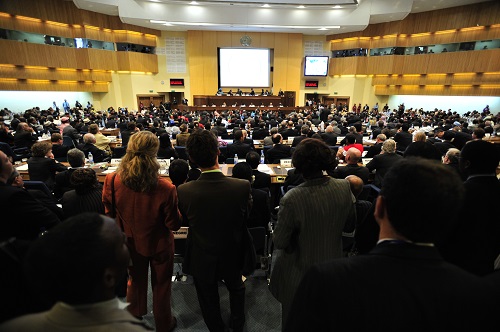CC photo
By
Fanuel Lakew
One of the major focuses of the 11th Extraordinary Session of the Assembly of the African Union (AU) held here in Addis was regarding the institutional reform of the union. Accordingly, the member states of AU agreed to adopt the reform which constitutes four action areas—enabling the AU to finance itself in the long term; focusing the organization on key priorities with continental scope; realigning AU institutions to deliver against those priorities and managing the business of the AU effectively in both political and operational terms. Many experts have been expressing their view regarding the agreed upon reform agenda.
To discuss this matter, I had an exclusive interview with Jean-Baptiste Ndikubwimana who is a researcher and assistant lecturer in the School of Social, Political and Administrative Sciences at the University of Rwanda.
AU member states agreed on reforms to reduce donor dependence. How do you see this move? Do you think there will be a positive outcome in the matter?
JBN: In my way of understanding, the regional integration in Africa is made by scattered organizations resulting from arrangements of top leaders (some scholars call them Neo-patrimonial leaders) whose missions and ambitions end with their regimes. You see that in Africa, the spirit of institutionalization still lacks. That is why when Kaddafi was killed, he went with all his ambitions. Another point is that most leaders are trapped in the bottleneck of the superpower countries to the extent that they are called puppet leaders.
AU, to be able to finance the reforms, may be possible if there is a shared political will of transforming Africa starting from human development: reforming education, creating quality, stopping brain drain, financing socio-economic transformation of all three sectors, transforming natural resources into final products, developing military arsenal to keep away wolves (those superpowers) that want to keep Africa in total dependence and cooperate with some superpowers which are not imperialists or who are not driven by Neo-colonialism culture, etc. AU should also not be isolated from global politics: governance oriented from principles of human rights, democracy, must be kept into mind because a leader taking power for all his entire life (Uganda, Gabon, C.Brazaville, etc) does not ensure sustainable peace. If Kaddafi transferred power to someone else, perhaps wolves could not find loopholes to topple him. Lasted regimes start to destruct by themselves because their scandals committed by leaders (corruption, nepotism, mass violation of human rights,) from which external wolves can take advantage.
What do you think are the implications of AU reforms for the Regional Economic Communities (RECs)? Is it because many people argue that Africa first needs to overcome its current economic and political fragmentation?
JBN: It would be good if we have AU and stop this fragmentation of integration such as EAC, CPGL, ICGLR, SADC, IGAD, etc. Because this fragmentation is an evidence of “not pulling in the same direction”. The implication of AU and not fragmented blocks is that big socio-economic projects such as railways linking countries from Alexandria to Johannesburg, Matadi to Addis Abeba will be implemented.
How about barriers to do business across the continent while few countries serve visa-on-arrival services to African nationals? Will African countries surrender their sovereignty for continental integration taking illicit arms flows, porous borders into consideration?
JBN: The fact that African countries do not surrender their sovereignty for continental integration is evidence of the lack of political will. Countries are still concerned with their own internal affairs rather than a global vision of pulling together. Yet they forget this principle: ‘United we stand, divided we fall’. Illicit arms flow and the porous border is an alibi. There are other reasons. There are countries that think they are endowed with natural resources not to share with other countries. This the case of Tanzania in EAC whose position is to consider Rwanda, Burundi and Kenya with small land as threats to Tanzania. If you read the EAC Common Market protocol it reads “free movement of the people, goods and services” but when it comes to implementations, there are many barriers. Recently when I was in Nairobi, citizens from members of EAC countries were shocked by the decision of Mathiang (the Home Affairs Ministry) who obliged each citizen to have an employment permit. This decision was to protect the market for the local Kenyans yet Rwanda did not enact such an unpopular decision.
Fanuel Lakew
Fanuel Lakew is a reporter at the Ethiopian Herald Newspaper of the Ethiopian Press Agency. He did his B.A. degree in Political Science and International Relations from Addis Ababa University in 2012. He also served as the Secretary-General of the Ethiopian Political Science and International Relations. He as well studied M.A. in Politics and International Relations at the Central University of Gujarat, India. He can be reached at [email protected]



No Comments Yet!
You can be first to comment this post!